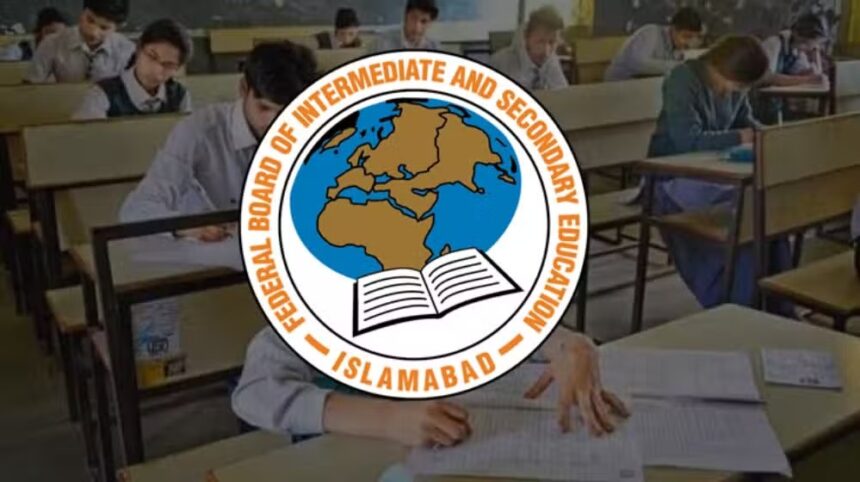**FBISE Addresses Key Policy Changes and Stakeholder Concerns in 60th E-Kachehri**
The Federal Board of Intermediate and Secondary Education (FBISE) recently held its 60th virtual E-Kachehri, a stakeholder engagement session aimed at clarifying major academic and examination policy reforms. Led by Director Mirza Ali and Controller of Examinations Aqeel Imran, the session focused on the rollout of the Inclusive Scheme of Studies 2024, addressing concerns related to curriculum changes, practical assessments, and examination marking procedures.
Central to the reforms is the introduction of Tarjamat-ul-Quran as a compulsory and standalone 50-mark paper at all secondary and higher secondary levels—specifically 9th, 10th, 1st year, and 2nd year. This move, in line with national educational directives, increases overall examination marks from 1100 to 1200. The board has disseminated detailed assessment frameworks and model papers for both Urdu and English mediums via its digital portal, urging all stakeholders to consult these resources for accurate understanding and exam readiness.
Officials provided further clarification regarding religious studies: Ahadith content will now be included exclusively in the existing 50-mark Islamiyat (Compulsory) paper, separate from the new Quranic translation paper. Flexibility was emphasized, with students permitted to attempt the Tarjamat-ul-Quran paper in either English or Urdu, provided the language choice is specified beforehand.
In response to concerns about curriculum overload, FBISE clarified that the inclusion of Tarjamat-ul-Quran is a federal mandate and not a board-level decision. Nonetheless, the board has taken steps to develop accessible study materials and frameworks to support students during this period of transition, ensuring a fair and manageable assessment experience.
One of the session’s key topics was the Practical-Based Assessment (PBA) protocol. It was announced that students currently enrolled in 9th and 1st year will not face PBA exams in the 2026 academic year. Instead, comprehensive practical assessments will be conducted in 10th and 2nd year exams in 2027. Consistent engagement with laboratory work throughout the academic year remains mandatory to build practical competencies, and teachers are urged to follow the prescribed frameworks to avoid last-minute challenges.
FBISE reaffirmed the continued implementation of the curricular framework introduced in 2022–23 across major subjects, including sciences, English, Urdu, Pakistan Studies, Islamiyat, and Tarjamat-ul-Quran. Textbooks will remain as supplementary resources, but exams will be based specifically on the approved SLO-based coursework.
The Each One Teach One (EOTO) initiative, which encourages students to participate in adult literacy efforts, will recognize participants with a supplementary certificate valued at 10 marks. This certificate, awarded upon verification from the National Commission for Human Development (NCHD), will be issued separately from the official marksheet.
Addressing transparency in improvement exams, the board stated that any attempts to improve marks will be documented in the remarks section of the results card, clearly indicating whether an improvement was achieved.
On the subject of aggregate marking, it was clarified that passing status is determined by the combined average of both years’ results, provided all papers are attempted. Absence in any required exam component will result in automatic failure, regardless of aggregate marks.
The session also took note of operational grievances such as errors in objective papers, frequent syllabus modifications, and unavailable model papers. The board assured that all such issues are reviewed by subject experts, and adjustments or grace marks are awarded when justified to safeguard student interests.
FBISE emphasized transparency in its rechecking policy. Marks may be increased or decreased upon re-evaluation, in line with procedural guidelines outlined under Clause 1.5 of Volume 2 of the Examination Rules. Applications for rechecking are accepted online within 20 days of result announcements and can be tracked digitally.
Finally, addressing speculation regarding upcoming results, FBISE confirmed that HSSC Part I and II results are set for release in the last week of August 2025. Students and parents are advised to rely solely on updates from the official FBISE portal and disregard unverified information.
This E-Kachehri highlighted FBISE’s ongoing commitment to transparent governance, clear communication, and responsive adaptation of educational policies. By integrating digital engagement with open stakeholder forums, the board continues to set national benchmarks for educational reform and public accountability.











